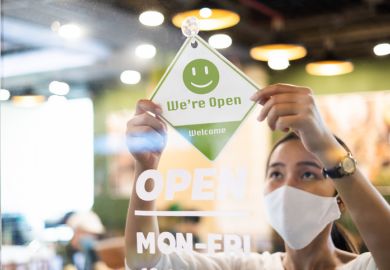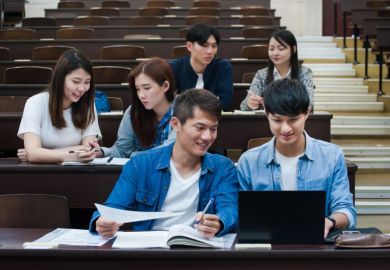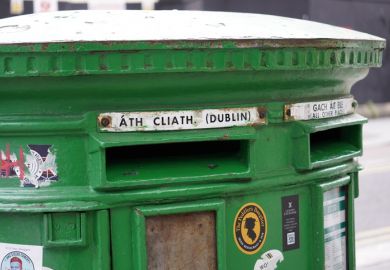A couple of years ago, a decision was made to “professionalise” the rather messy corridor where my university’s drama offices were situated. An influx of lecturers on new programmes needed office space, you see.
So out went the easy flow of laughing students – not to mention the occasional heated debate between colleagues – on the run from one rehearsal to the next. In came a great deal of instructional signage and eight shiny pot plants, evenly spaced and hooked up to slow-drip life-support feeds. Each pot had a label politely requesting that the plants should not, on any account, be watered (and providing an internal extension number should you wish to “adopt” one).
For many of our near neighbours, this reclamation of reflective space was a welcome return to a traditional, monastic academic environment. And although we naturally prefer the drama department to be at the heart of the institution, we have successfully relocated to a less prominent area – and my inbox contains fewer noise-related complaints.
The plants, meanwhile, have flourished since their corridor was abandoned by staff and students last March.
The welcome news is that the UK government is allowing students on practical and creative courses to return from this week. This has again focused our minds on the relationship of a university’s staff and students with their university’s physical environment. And at the heart of this debate is the question of what the campus is now for.
Failure to capitalise on the way some students and staff have successfully adapted to lockdown would be a missed opportunity. For some in higher education, online learning and enhanced digital capability offer a utopian vision of expanded markets, flexibility, better home-life balance, the end of the daily commute, cool new ways to communicate and present, the democratisation of craft and technical skill. It also offers some form of Covid security in a world where total eradication now seems impossible; some of our staff are certainly a little trepidatious about the return to campus – particularly as the vaccine hasn’t reached all of us yet.
As for the students, it has been fantastic to see ours joyously grabbing the means of production and demonstrating that they don’t always need permission or a learned formula to create their art. We’ve seen remarkable short films, podcasts and live streams. New platforms have opened and new audiences have been reached. However, the overwhelming sense we’ve had from our regular online group tutorials is that none of this mitigates fully the isolation and loneliness of remote working.
For the next few weeks, our 200 drama students and their instructors will have much of the campus to ourselves. How we manage both our enthusiasm and anxiety will offer the university many clues as to how it can sensibly open up more widely over the next few months if, as expected, restrictions are lifted further.
We’re also aware that we have an opportunity to be in the vanguard of exploring how the campus might operate in the future. If we’re responsible, we’ll reassert the model of a vibrant community, sharing space as well as ideas, relishing the opportunity to meet and interact in three dimensions rather than two. Failure to understand that the physical campus offers a place of belonging – a home from home, which can be inspiring as well as functional – would be a dereliction of duty, too.
For my part, I believe that running vocational acting and technical theatre courses in a university, rather than as a free-standing conservatoire, brings great advantages to our students. They’re part of something much bigger than themselves. It inspires them to see elite athletes run impossibly fast round the track or to overhear trainee teachers plot their next creative assault at their placement schools. That’s why I really hope that other disciplines will soon rejoin us on campus.
But when I look at those preternaturally healthy, meticulously spaced plants in our lost corridor, I am reminded of the perils of sleepwalking into a dystopian world in which digitised higher education embraces a form of consumerist, individualised learning, with the focus on efficiency over effectiveness, compliance over curiosity and freedom of choice over commitment to a shared project. And I wonder whether the great reset may be less about modes of delivery or work-life balance and more about repurposing our programmes in support of the social and civic role that we might play.
Community, after all, is also about offering our resources, programmes and imaginations to the broadest local constituency possible, trusting and sharing time and stories with those who, prior to the pandemic, never felt that the campus was a place for them. This work might be intergenerational. It might seek out those who have lost their way or been forced to change direction by the pandemic. However it works, it should certainly empower those we work with to create new knowledge and shape the future.
It is a bit like caring for plants. There may be a certain logic to automatically drip-feeding them in absentia, via algorithm and automated tap. But I can’t help thinking that they would be a lot more valued if they flourished among us, placed where we please and cared for by a community of human hands.
Mark Griffin is head of drama at St Mary’s University, Twickenham.
Register to continue
Why register?
- Registration is free and only takes a moment
- Once registered, you can read 3 articles a month
- Sign up for our newsletter
Subscribe
Or subscribe for unlimited access to:
- Unlimited access to news, views, insights & reviews
- Digital editions
- Digital access to THE’s university and college rankings analysis
Already registered or a current subscriber?








